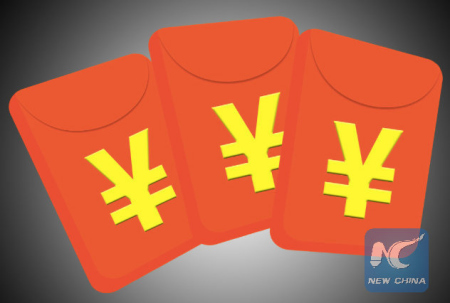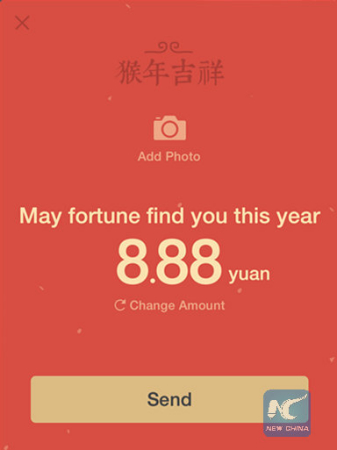
Cartoon shows digital "red envelopes" used in Chinese social media. (Web pic)
Do you know how crazy Chinese are about "Hongbao", or red envelope in English, during the Chinese lunar new year? On the last day of the Year of the Sheep alone, 8 billion hongbaos have been set by 420 million users of the messaging app WeChat.
Of course, they are all virtue hongbaos with digital but real money, though the term traditionally refers to red envelope filled with paper money.
For over 1,000 years, giving and receiving hongbaos is seen as a symbol of the celebrations in Chinese New Year that falls on Monday this year.
Originally, hongbaos were given to kids as "Yasuiqian", or year-end lucky money in English, by senior members of the family who hope to protect them from evil spirits with the blessing.
For a long time, the amount of money inside was actually trivial, because most Chinese were very poor before the country's reform and opening-up drive in the 1980s. Therefore, what really matters is the good wishes attached to the red color.
As the hongbao culture evolves, the red envelopes are also given to the old by other grownup family members to extend New Year greetings.
Though traditionally delivered face to face in real envelopes, an increasing number of Chinese are getting used to give or take hongbaos in virtual format in recent years when Internet tech giants like Tencent and Alibaba are digitalizing almost any everyday activity by Chinese with the rapid development of the mobile Internet in the country.

Over the past years, Tencent and Alibaba have put in billions of money to popularize their mobile payment services, attracting hundreds of millions of people from the bank counters to their apps like WeChat and Alipay.
Now people are well-trained to send or take hongbaos through WeChat or Alipay over the phone, within seconds.
With this degree of convenience, the tradition quickly evolves as sending hongbaos between friends on social media are seen as a game or a method to enhance their friendship.
Therefore, hongbaos are actually not limited to New Year greetings anymore.


















































